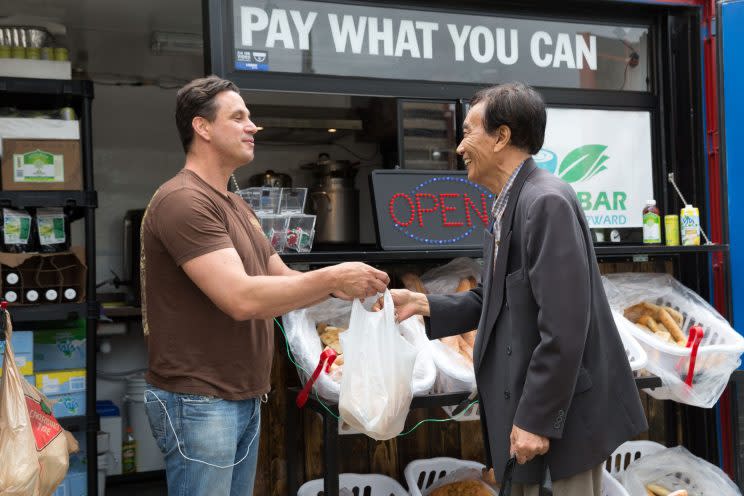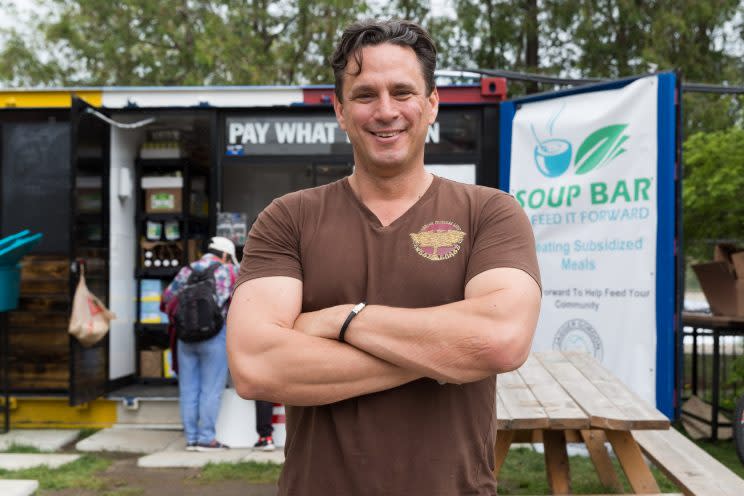Feed it forward: Toronto pop-up charges little — or nothing at all — for meals

Toronto chef Jagger Gordon’s retrofitted shipping container turned pay-what-you-can soup and sandwich bar is giving new life to foods destined for landfills. But the Soup Bar – under his not-for-profit program Feed It Forward banner – is just one step in his ongoing effort to tackle food insecurity through “marginalized” food, blemished fruits and veggies and leftovers that would otherwise wind-up as waste.
“We’re at $31 billion dollars worth of food here alone in Canada… that could feed the world’s hungry three times every year so I said okay I’ve got to challenge this,” says Gordon, who runs a catering company.
He’s launched a petition to have Canada change its laws surrounding businesses throwing out unsold yet still edible food, in the same ways France and Italy have. He has almost 43,000 signature so far.
But he’s not sitting around to wait for results.
His Toronto pop-up, at Dundas and Bathurst just outside of the Scadding Court Community Centre where Gordon runs monthly programming, sources between 300 to 500 pounds of bread every day from a bakery that supplies the biggest hotels in the city. Other foodstuffs – fresh ingredients, fruits and vegetables come via donations or blemished products from markets.

For every $2.50 meal purchased, the Soup Bar places a chip in the jar that can be redeemed by those who can’t afford a meal.
“There are times in people’s lives where they just can’t make ends meet,” says Gordon. “I’m not judging… if they’re humble enough to ask for it then (it’s their’s) because it’s coming almost free to me.”
He says that while he’s constantly looking for partners, it hasn’t stopped him from forging ahead with other projects. This past Christmas he fed 1,250 with food diverted from landfills. He previously ran a community freezer program where eight different families could obtain nutritious meals through a lottery system.
But his upcoming projects aim to tackle both waste diversion and food insecurity in tandem.
At the end of August, Gordon is launching a pilot program with the University of Toronto and the Institute for Global Health Equity and Innovation to take marginalized foods and turn them into nutritious meals and flash freeze them for students.
“We’re going to feed 25,000 to 40,000 students with marginalized foods (and) if it works, which it will, we’re going to roll it out across Canada into all the universities,” he says.
Students can use an app to obtain the meals. He’s also launching a second app where restaurants can offer meals made with leftover foodstuffs and offer them up at lower costs in biodegradable containers from Feed it Forward.
“The app’s gonna allow people to obtain their favourite meals from their favourite restaurants at a subsidized prize – that $20 meal is now going to be between $3 to $5,” he says.

In and amongst all that, he’s also planted around 20,000 pounds of vegetables he plans to sell through a pay-what-you-can grocery store. But he’s not accomplishing this all alone, he relies on the tireless efforts of volunteers and underwrites his efforts with funds from his catering business.
“I take a little less of my pay and I put it forward… I live comfortable but I don’t need to live over and above right now, at this point,” he says. “I’d rather make a statement in our country, show that I can take less, give more.”
When asked where he gets the energy, Gordon says a lot of it comes from seeing that end game: feeding people who are struggling to feed themselves.
“I’m a go, go, go, go and don’t stop until… actually I haven’t stopped so I don’t even now when to stop – I’m just going to keep on going,” he says adding that his new slogan is Need to Feed. “I need to feed and that just where it’s at and when I get a whole army behind me on the streets making a change… then I’ll slow down.”

 Yahoo Finance
Yahoo Finance 